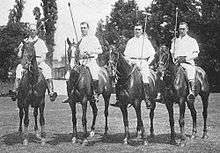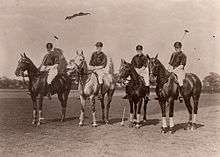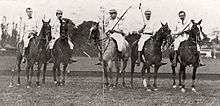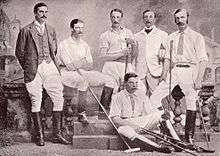International Polo Cup




The International Polo Cup, also called the Newport Cup and the Westchester Cup is a trophy in polo that was created in 1876 and was played for by teams from the United States and England. The match has varied in length over the years from a single game to the best of three games. In 1886 it was decided to make the polo match a continuing competition. There were a total of 12 matches conducted between 1886 and 1939 between the two countries. The tournament was revived in 1992.[1] the last match was held on July 28, 2013 at Guards Polo Club.[2]
History
The cup was first awarded to the team of Sir John Watson in 1876 in Newport, Rhode Island. The cup was later purchased by a subscription and presented to the Westchester Polo Club in 1886. It was won again in 1886 and 1902 by English teams from the Hurlingham Club. In 1909 James Montaudevert Waterbury, Jr., Lawrence Waterbury, Harry Payne Whitney and Devereaux Milburn formed a team, dubbed the Big Four, that won the cup from the English.[3] The same team was successful in 1911 and 1913, but lost the cup to England in 1914. In the 1920s and 1930s, the Westchester Cup was the most anticipated event on the sporting calendar in the United States.[4][5]
Winner
The cup has been won a total of 10 times by the United States and 6 times by England, including the initial 1876 match. The match was suspended in the 1940s due to World War II and was not revived until the 1990s.[6][7]
External links
- International Polo Cup team photographs
References
- ↑ Webbe, Alex. "The Westchester Cup". Retrieved 3 October 2010.
- ↑ Staff. "England takes on USA for the Westchester Cup". Guards Polo Club. Retrieved 11 July 2013.
- ↑ "Monte Waterbury, polo player, dead". The New York Times. August 29, 1920. Retrieved 19 September 2010.
- ↑ "Sport: Westchester Cup". Time magazine. June 19, 1939. Retrieved 27 September 2010.
- ↑ "Polo Cup Gift of Deed. August Belmont's Proposals Accepted by Hurlingham Club". New York Times. June 30, 1912.
The Hurlingham Club of London has accepted the proposal of August Belmont for the International Polo Cup. The document covering all the details of the deed of gift was framed last year by Mr. Belmont after a consultation with the Hurlingham Club.
- ↑ "America Wins, Polo Cup Stays" (PDF). New York Times. June 14, 1913. Retrieved 2009-11-24.
- ↑ "Facts: Westchester Cup, International Polo, Great Britain vs. United States". 2009 Westchester Cup. Retrieved 4 October 2010.
- ↑ "Polo Ponies Sail To-Day. Will Be Used in the International Match at Hurlingham. The Pick Of Six Stables. Twenty-four in All, Furnished by Gould, Mackay, Cowdin, Agassiz, and "Larry" Waterbury". New York Times. January 11, 1902. Retrieved 2011-04-05.
Twenty-four of the most valuable and thoroughly tried-out polo ponies to be found in the United States will sail early this morning for England on the steamship Minneapolis. They represent the string which, with the addition of Foxhall Keene's ponies, already in England, will be used by the American players in the coming international match with the crack players of the Hurlingham Club.
- ↑ "The Coming International Polo Contest". New York Times. March 2, 1902. Retrieved 2011-04-07.
International athletic contests have become so numerous lately that they have almost ceased to be a novelty. Their interest, however, has not diminished, and if one looks at the yacht racing rivalry between England and America for an example, it would seem as though popular enthusiasm increased with each new contest. ...
- ↑ "American Polo Victory. Englishmen Beaten in the First International Cup Match". New York Times. June 1, 1902. Retrieved 2015-02-20.
The first test polo match for the American Cup was played at Hurlingham to-day between the English and American teams, the latter winning by a score of 2 goals to 1. The weather was fine and the ground was good, but soft. An enormous crowd, including many ladies, was present.
- ↑ "English Polo Team Wins. Americans Beaten at Hurlingham by Six Goals to One. Second Contest For The Cup. Honors Are Now Even, and the Deciding Match Will Be Played on Saturday". New York Times. June 10, 1902. Retrieved 2015-02-20.
The second game of polo for the international cup was played to-day at the Hurlingham Club, and the English team won by six goals to one. The Americans have the satisfaction of knowing that the game was one of the most brilliant ever played at Hurlingham.
- ↑ "English Polo Team Wins. Americans Beaten in Deciding Game for International Cup. Score was 7 Goals to 1. Splendid Plays by Keene, but the Defense of the Losers Was Weak. Muddy Field at Hurlingham". New York Times. June 22, 1902. Retrieved 2015-02-20.
England won the third and decisive polo game to-day at Hurlingham in the series of international competitions for the American Cup and the trophy, which has been in possession of the English poloists since 1886, will remain in this country, probably for a number of years to come.
- ↑ Polo in the United States. McFarland. p. 66.
John Hardress Lloyd was joined by four Army captains, Frederick Barrett, Leslie St. C. Cheape and Eustace 'Bill' Palmes, all 10-goalers in India, and Herbert Wilson, a 9-goal handicap player. Lt. Arthur Noel Edwards was the designated spare ...
- ↑ "Polo Match to Be Played To-morrow. Sunshine and Wind Needed to Dry Out Field. Rainstorm Passes Away". New York Times. June 8, 1911. Retrieved 2013-12-31.
The international polo teams received another day of enforced, rest yesterday, made necessary through unfavorable weather conditions for the playing of the second match of the cup series, which will be decided to-morrow, weather permitting. The rainstorm passed away late yesterday afternoon and fair weather is predicted for to-morrow. ...
- ↑ "At Meadow Brook". Time magazine. September 15, 1930. Retrieved 2011-04-05.
Critics had predicted a runaway for the Americans. This did not happen. Through the first half, and until the seventh chukker. the Englishmen made it hard. Lacey's Argentine ponies outran the bigger U. S. mounts for a while; first Guest, then Roark and Hitchcock broke mallets. Lacey stole the ball from Hopping and Hitchcock for beautiful shots. What the English team lacked most was an accurate goal shooter like Pedley. Consistently the ball was fed to Balding at No. 1, but under pressure, Balding's shots were sliced, sometimes missed entirely.
| Wikimedia Commons has media related to International Polo Cup. |